Gulftainer
Gulftainer is an independently owned, global port operator with its corporate head office in the United Arab Emirates (UAE). Established in 1976, the company today manages about 40% of all the major container terminal facilities in the Middle East and has business operations in seven countries around the world.[1] The company's primary business is container, with additional and bulk cargo handling within port terminals and logistics cities.
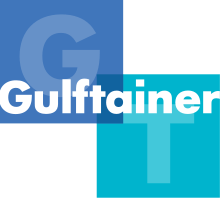 | |
| Limited Liability Company | |
| Industry | Port Operations & Management and Transport & Logistics |
| Founded | 1976 |
| Headquarters | Sharjah, United Arab Emirates |
Area served | United Arab Emirates, Iraq, Lebanon, Saudi Arabia, Pakistan, and the United States |
| Products | Port investment, development, management and operations. Transport of all cargo types including: project cargo; Third party logistics; freight forwarding; contract logistics; container repairs and minor ship repairs |
| Services | Ports and logistics management |
| Revenue | US$1 billion 2017 |
| Parent | Crescent Enterprises |
| Subsidiaries | Momentum Logistics |
| Website | gulftainer |
History
Gulftainer was formed in 1976 to manage and operate the Sharjah Container Terminal (SCT) on behalf of the Sharjah Port Authority. Ten years later a concession was awarded to Gulftainer to manage and operate Khorfakkan Container Terminal (KCT) in Khorfakkan Port and the container terminal in Hamriyah Port, Sharjah. In 2004, Gulftainer expanded beyond the UAE, initially as a consultant to the Kuwait Port Authority. Later the same year, it inaugurated the purpose-built Sharjah Inland Container Deport (SICD) near the Sharjah–Dubai border.[2] Further development continued into South Asia and Africa in 2006,[3] as it commenced transport and logistics joint ventures with Pak Shaheen in Pakistan, and UAE based Al Marwan, to manage and operate Moroni Port in the Comoros Islands.
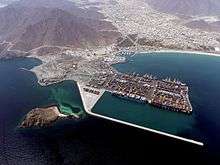
In 2008, a transport and logistics joint venture with Demas International in Turkey lead to Gulftainer launching Momentum Logistics, a full-service third-party logistics company. Momentum was soon awarded a contract to manage logistics and vessel operations at Ruwais Port in Abu Dhabi (UAE) in 2009.
The Iraqi Port Authority granted Gulftainer concessions to operate cargo facilities in Umm Qasr Port, the primary marine gateway into Iraq. Terminal operations started in 2010; and were expanded in 2012. In 2013, Gulftainer commenced development of a logistics city development in Umm Qasr,[4] which is now fully operational.
In 2011, Gulftainer signed a major joint venture agreement with Prominvest, the financial and investment arm of Russian State Corporation, Russian Technologies to develop projects in Russia.[5] The company made its first expansion into South America, by establishing terminal operations in the Port of Recife, Brazil in 2012. In the same year Gulftainer was awarded the concession to develop and operate a new container terminal at the Port of Tripoli in Northern Lebanon[6] The concession is for 25 years with an investment of over USD 60 million in new equipment and machinery. In June 2013, Gulftainer completed a major acquisition by securing the majority shareholding in Saudi Arabia's Gulf Stevedoring Contracting Company (GSCCO) almost doubling the company size. This acquisition made Gulftainer the largest port operator in the Middle East with regard to the number of terminals managed.[7]
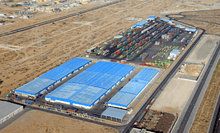
In June 2014, Gulftainer signed a 35–year concession with the Canaveral Port Authority in Florida, USA to operate and develop its container and multipurpose cargo terminal. The terminal, is Gulftainer's first venture in the United States.[8]
In September 2018, Gulftainer signed another contract in the US, a 50–year concession to operate the port of Wilmington, Delaware. The deal included a US$600 million investment commitment and upgrades to training facilities and terminal capabilities.[9]
In August 2019 Gulf Stevedoring Contracting Company began operations at the King Fahad Industrial Port, Yanbu in Saudi Arabia, handling both container and breakbulk cargo.[10]
The Gulftainer Group operates and manages ports and logistics businesses in several countries, including the UAE, Iraq, Saudi Arabia, Lebanon, Pakistan, and the United States.
Timeline
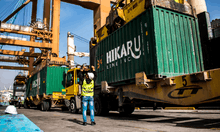
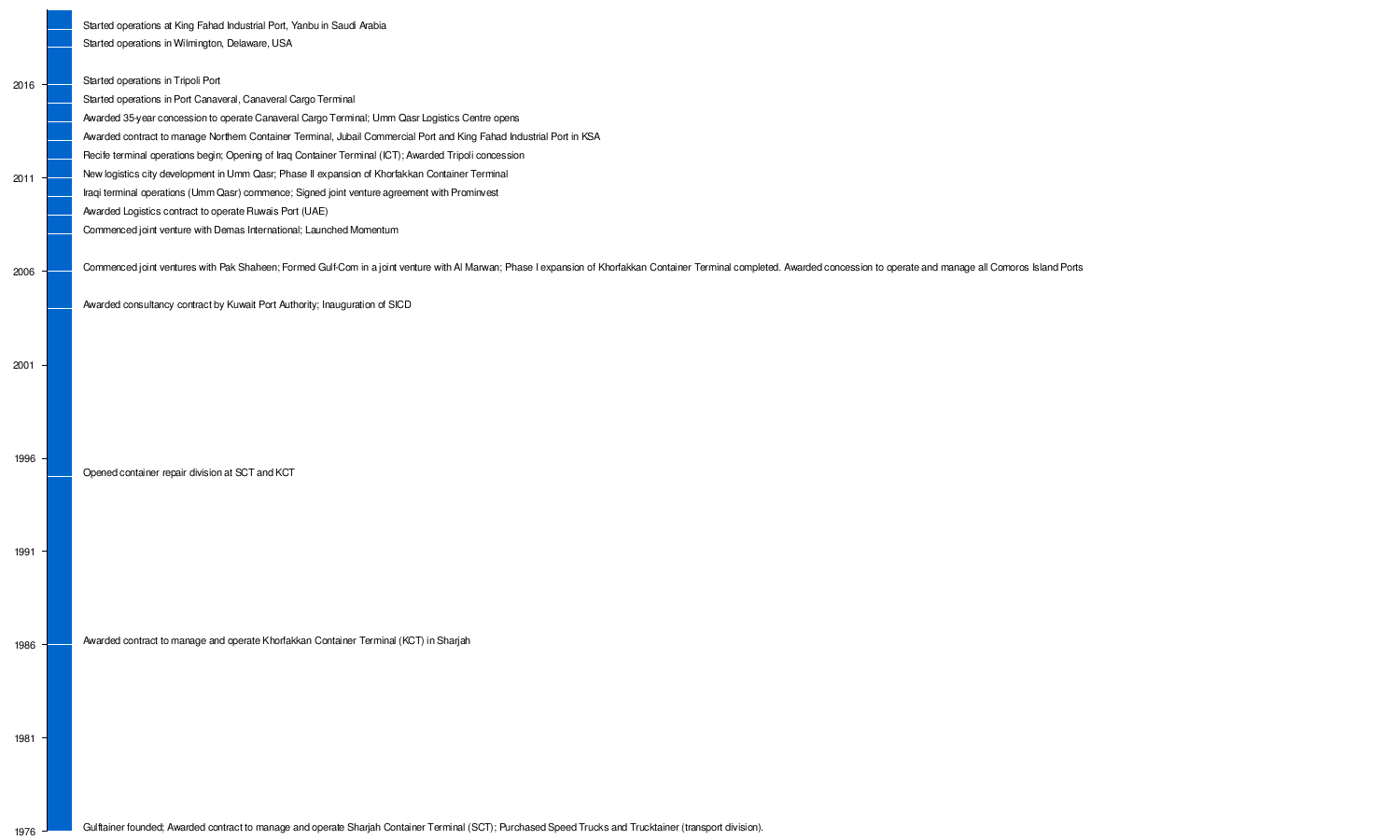
Operations
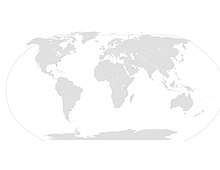
In the UAE, Gulftainer operates three container terminals on behalf of the Sharjah Port Authority:
- Khorfakkan Container Terminal, strategically located on the east coast.
- Sharjah Container Terminal, based in Port Khalid, which is a major import–export facility for industries located in Sharjah, in the UAE's industrial zones, and in the Northern Emirates, along with container facilities in Hamriyah Port.
- Hamriyah Port, located on the west coast of the UAE. A deepwater seaport located in the Hamriyah Free Zone. Container operations are managed by Gulftainer.
Gulftainer operates the Iraq Container Terminal and the Iraq Project Terminal at the Umm Qasr Port. In Lebanon it operates facilities in the Port of Tripoli; whilst in the United States, Gulftainer commenced operations of all container and multi cargo facilities in Port Canaveral, Florida in January 2016.[8] In September 2018, Gulftainer signed a 50—year agreement to manage operations at the Port of Wilmington, Delaware.
Gulftainer's non-port business activities include providing 3PL (Third party logistics) services within the UAE, Iraq, and Pakistan. Momentum Logistics, Gulftainer's logistics subsidiary manages the group's transportation and logistics operations throughout the Middle East and Asia.[11]
The company owns and operates three logistics centres:
- Saja'a Industrial Investment Park (SIIP), situated on the outskirts of Sharjah;
- the Sharjah Inland Container Depot on the Dubai—Sharjah border with services ranging from customs clearance, warehousing and storage, to inland transportation, and;
- in Iraq, the Umm Qasr Logistics Centre, a fully integrated logistics facility, spread over an area of 750,000 square metres (8,100,000 sq ft).[4] enabling the direct movement of cargo from the Iraq Container Terminal (IPT) in the North Port, without the need for port side customs clearance.
In Saudi Arabia, Gulftainer operates container terminals within the Jubail Commercial Port and King Fahad Industrial Port.
Recognition
Khorfakkan Container Terminal has been recognized as the most productive port in Europe, the Middle East and Africa (EMEA) by the Journal of Commerce in 2013.[12] It was also awarded a second place in the top 10 terminals in EMEA and third in the top 10 worldwide ports category.[13] Gulftainer's KCT was the first port of call[1] in the Middle East for CMA CGM's Marco Polo – at the time, the world's largest container ship – on its maiden voyage across the Persian Gulf.
In December 2016 and October 2017, Gulftainer was awarded the "Port Terminal Operator of the Year by Seatrade Middle East Awards."[14] This was followed by the Gulftainer company receiving the "Technology Implementation of the Year" category at the Logistics Middle East Awards 2017.[15]
In September 2017, Gulftainer CEO Flemming Dalgaard was named Industry CEO of the Year at the ITP CEO Awards, whilst in October 2017 Gulftainer won the Corporate Health and Wellness Initiative Award at the MEED Daman Health Awards.[16][17][18]
In March 2018, Gulftainer won the Logistics Middle East Awards 2018 for The CSR Initiative of the year.[19]
See also
References
- "Gulftainer sees 24% increase in 2012 trade volumes". Gulftainer. 17 Feb 2013. Retrieved 8 March 2015.
- "Sharjah Inland Container Depot". Retrieved 21 April 2014.
- "Facts and Figures". Gulftainer.
- "Umm Qasr Logistics Centre". Gulftainer. Retrieved 8 March 2015.
- "Gulftainer to invest $500m in Russia". Trade Arabia. Retrieved 21 April 2014.
- "Lebanon signs contract with Gulftainer for Tripoli. port". 9 October 2013. Retrieved 21 April 2014.
- "Global Container Terminal Operators annual review and forecast 2013". Drewry.
- "Gulftainer Expands into USA". Gulftainer. Retrieved 8 March 2015.
- "Gulftainer Expands into USA". Reuters. Retrieved 20 September 2018.
- "Gulf Stevedoring to Operate King Fahad Industrial Port at Yanbu". Retrieved 26 May 2020.
- "Container Repair". Momentum. Retrieved 21 April 2014.
- "Gulftainer's UAE Terminal Ranked No. 1 Port in EMEA". Retrieved 18 March 2019.
- Mongelluzzo, Bill. "Port Productivity" (PDF). JOC Group. Retrieved 8 March 2015.
- "Sea Trade". Retrieved 21 October 2017.
- "Winners at the Logistics Middle East Awards". Arabian Supply Chain. Retrieved 21 October 2017.
- "CEO Middle East awards 2017". Arabian Business. Retrieved 15 December 2017.
- "Gulftainer Wins Corporate Health and Wellness Initiative Category at Daman Corporate Health Awards 2017". Zawya. Retrieved 15 December 2017.
- "Gulftainer wins Corporate Health and Wellness Initiative category at Daman Awards". Retrieved 15 December 2017.
- "Logistics Middle East Awards 2018 winners announced". Logistics Middle East. Retrieved 18 March 2019.